Roman Civilization Test 2: Julius & Augustus Caesar Overview
VerifiedAdded on 2022/11/18
|9
|2070
|421
Homework Assignment
AI Summary
This document presents a comprehensive solution to a Roman Civilization assignment, focusing on key figures and concepts from Modules 3 and 4, including Julius and Augustus Caesar. The assignment is divided into three parts. Part A requires the identification and explanation of various terms and names, such as "Veni Vidi Vici," Cleopatra, Clodius Pulcher, dictator, tribune, and consuls, demonstrating an understanding of their significance within Roman history. Part B asks for an analysis of specific figures from the assigned textbook, focusing on Roman Sexuality and Gender. Part C explores the concepts of praise and blame within Roman society, drawing on examples from Cicero's writings and other historical texts. The solution demonstrates an understanding of the political and social structures of ancient Rome, as well as the cultural values and practices of the time. The student has provided detailed explanations and analyses, supported by references to the course materials.
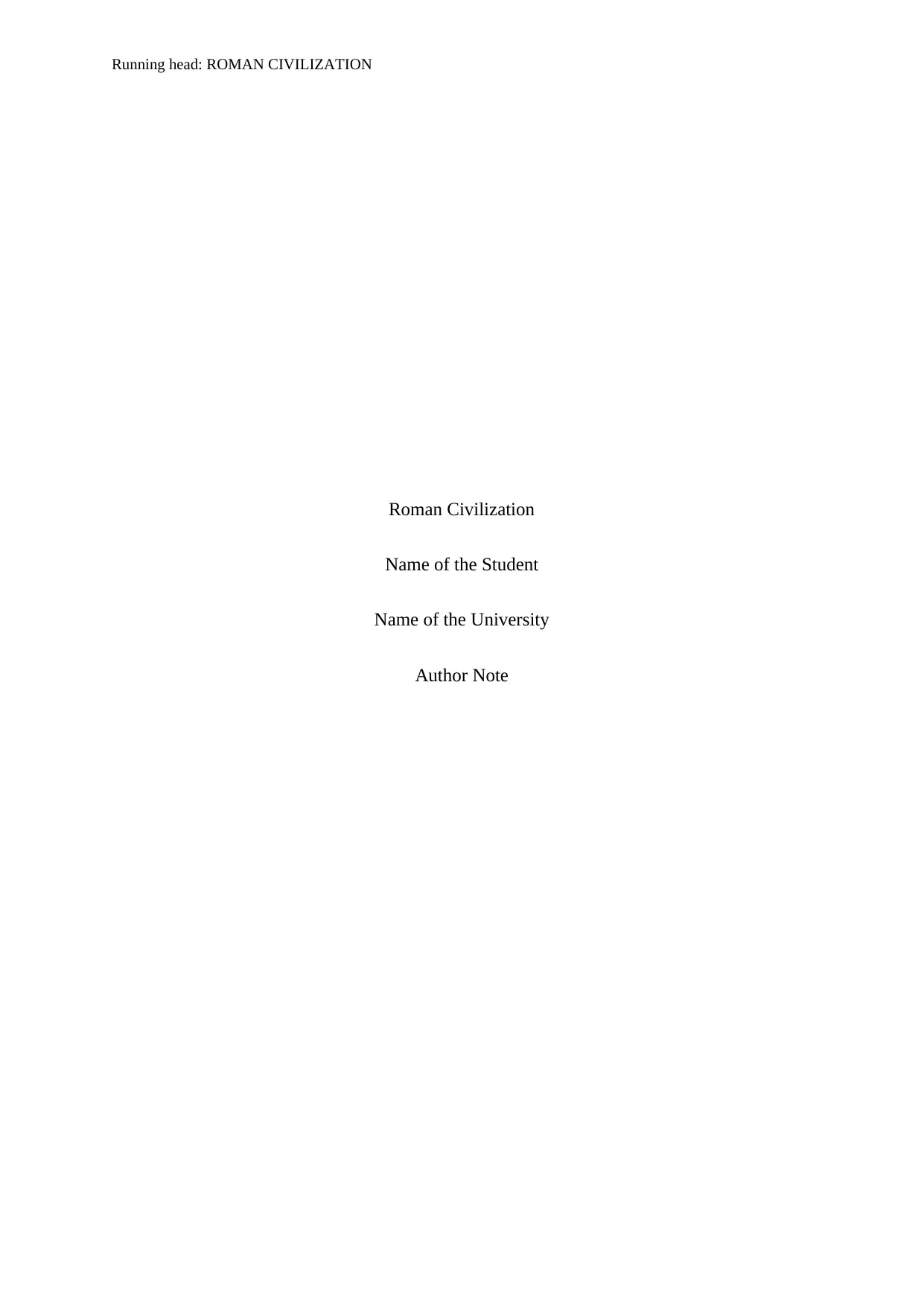
Running head: ROMAN CIVILIZATION
Roman Civilization
Name of the Student
Name of the University
Author Note
Roman Civilization
Name of the Student
Name of the University
Author Note
Paraphrase This Document
Need a fresh take? Get an instant paraphrase of this document with our AI Paraphraser
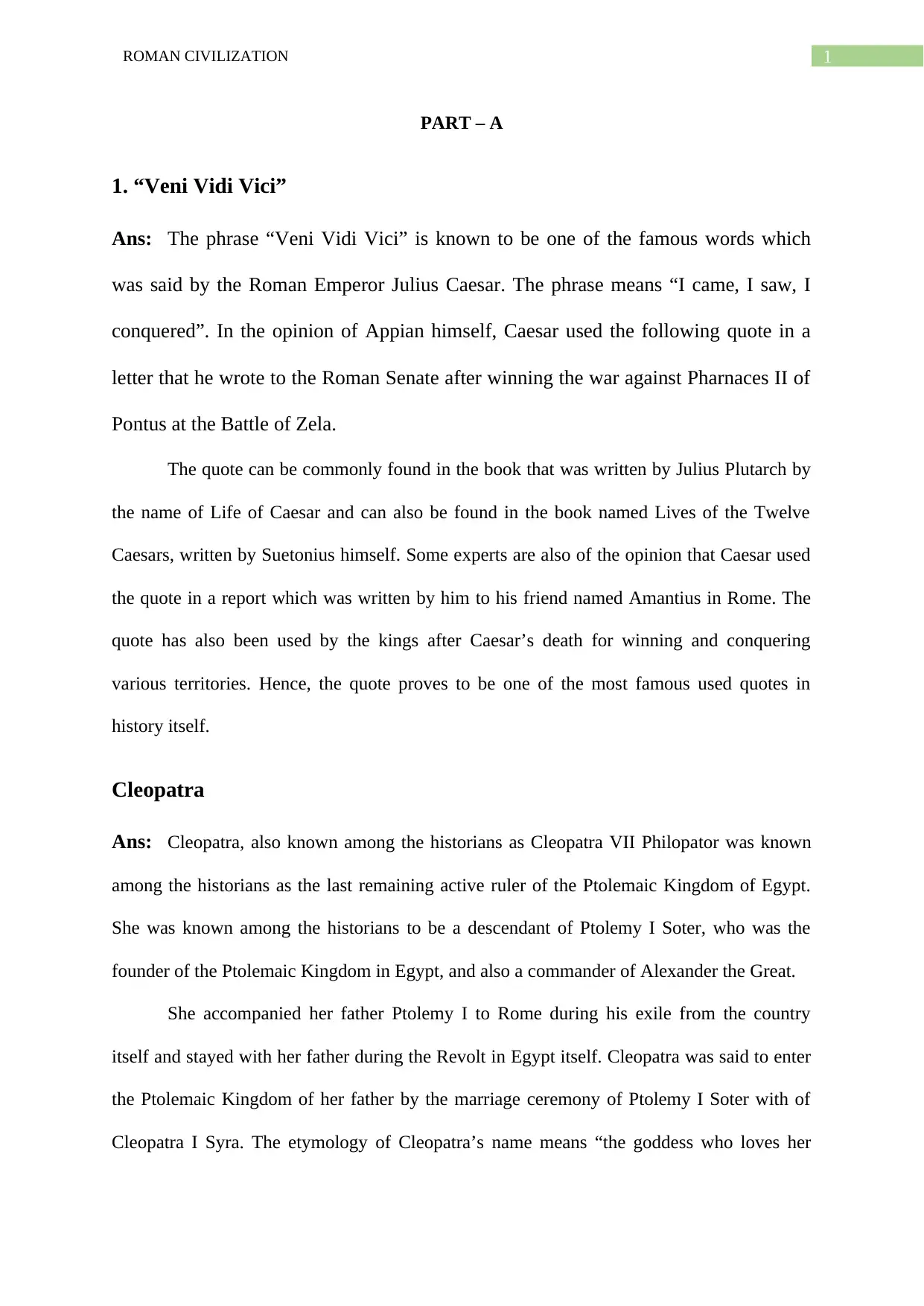
1ROMAN CIVILIZATION
PART – A
1. “Veni Vidi Vici”
Ans: The phrase “Veni Vidi Vici” is known to be one of the famous words which
was said by the Roman Emperor Julius Caesar. The phrase means “I came, I saw, I
conquered”. In the opinion of Appian himself, Caesar used the following quote in a
letter that he wrote to the Roman Senate after winning the war against Pharnaces II of
Pontus at the Battle of Zela.
The quote can be commonly found in the book that was written by Julius Plutarch by
the name of Life of Caesar and can also be found in the book named Lives of the Twelve
Caesars, written by Suetonius himself. Some experts are also of the opinion that Caesar used
the quote in a report which was written by him to his friend named Amantius in Rome. The
quote has also been used by the kings after Caesar’s death for winning and conquering
various territories. Hence, the quote proves to be one of the most famous used quotes in
history itself.
Cleopatra
Ans: Cleopatra, also known among the historians as Cleopatra VII Philopator was known
among the historians as the last remaining active ruler of the Ptolemaic Kingdom of Egypt.
She was known among the historians to be a descendant of Ptolemy I Soter, who was the
founder of the Ptolemaic Kingdom in Egypt, and also a commander of Alexander the Great.
She accompanied her father Ptolemy I to Rome during his exile from the country
itself and stayed with her father during the Revolt in Egypt itself. Cleopatra was said to enter
the Ptolemaic Kingdom of her father by the marriage ceremony of Ptolemy I Soter with of
Cleopatra I Syra. The etymology of Cleopatra’s name means “the goddess who loves her
PART – A
1. “Veni Vidi Vici”
Ans: The phrase “Veni Vidi Vici” is known to be one of the famous words which
was said by the Roman Emperor Julius Caesar. The phrase means “I came, I saw, I
conquered”. In the opinion of Appian himself, Caesar used the following quote in a
letter that he wrote to the Roman Senate after winning the war against Pharnaces II of
Pontus at the Battle of Zela.
The quote can be commonly found in the book that was written by Julius Plutarch by
the name of Life of Caesar and can also be found in the book named Lives of the Twelve
Caesars, written by Suetonius himself. Some experts are also of the opinion that Caesar used
the quote in a report which was written by him to his friend named Amantius in Rome. The
quote has also been used by the kings after Caesar’s death for winning and conquering
various territories. Hence, the quote proves to be one of the most famous used quotes in
history itself.
Cleopatra
Ans: Cleopatra, also known among the historians as Cleopatra VII Philopator was known
among the historians as the last remaining active ruler of the Ptolemaic Kingdom of Egypt.
She was known among the historians to be a descendant of Ptolemy I Soter, who was the
founder of the Ptolemaic Kingdom in Egypt, and also a commander of Alexander the Great.
She accompanied her father Ptolemy I to Rome during his exile from the country
itself and stayed with her father during the Revolt in Egypt itself. Cleopatra was said to enter
the Ptolemaic Kingdom of her father by the marriage ceremony of Ptolemy I Soter with of
Cleopatra I Syra. The etymology of Cleopatra’s name means “the goddess who loves her
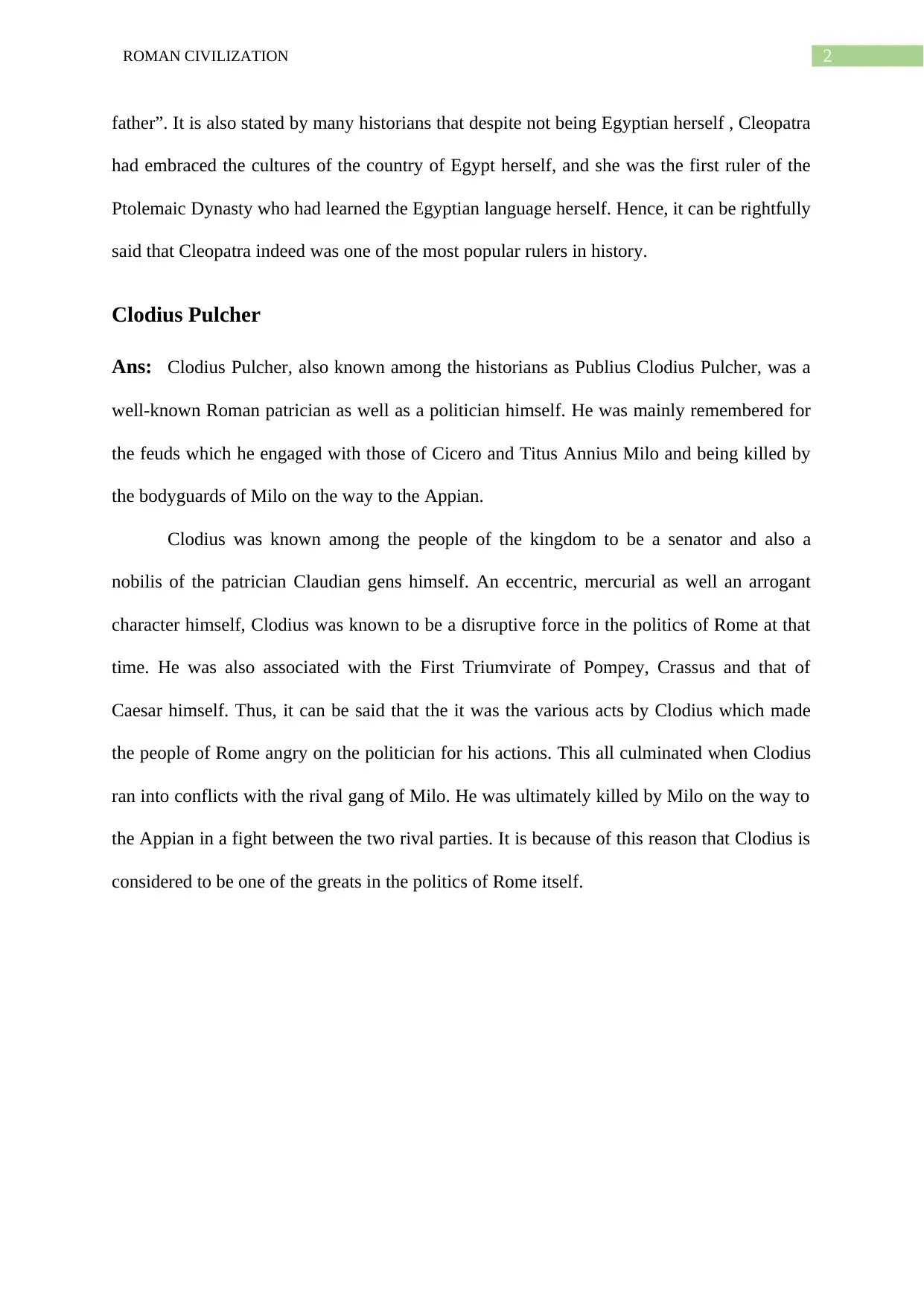
2ROMAN CIVILIZATION
father”. It is also stated by many historians that despite not being Egyptian herself , Cleopatra
had embraced the cultures of the country of Egypt herself, and she was the first ruler of the
Ptolemaic Dynasty who had learned the Egyptian language herself. Hence, it can be rightfully
said that Cleopatra indeed was one of the most popular rulers in history.
Clodius Pulcher
Ans: Clodius Pulcher, also known among the historians as Publius Clodius Pulcher, was a
well-known Roman patrician as well as a politician himself. He was mainly remembered for
the feuds which he engaged with those of Cicero and Titus Annius Milo and being killed by
the bodyguards of Milo on the way to the Appian.
Clodius was known among the people of the kingdom to be a senator and also a
nobilis of the patrician Claudian gens himself. An eccentric, mercurial as well an arrogant
character himself, Clodius was known to be a disruptive force in the politics of Rome at that
time. He was also associated with the First Triumvirate of Pompey, Crassus and that of
Caesar himself. Thus, it can be said that the it was the various acts by Clodius which made
the people of Rome angry on the politician for his actions. This all culminated when Clodius
ran into conflicts with the rival gang of Milo. He was ultimately killed by Milo on the way to
the Appian in a fight between the two rival parties. It is because of this reason that Clodius is
considered to be one of the greats in the politics of Rome itself.
father”. It is also stated by many historians that despite not being Egyptian herself , Cleopatra
had embraced the cultures of the country of Egypt herself, and she was the first ruler of the
Ptolemaic Dynasty who had learned the Egyptian language herself. Hence, it can be rightfully
said that Cleopatra indeed was one of the most popular rulers in history.
Clodius Pulcher
Ans: Clodius Pulcher, also known among the historians as Publius Clodius Pulcher, was a
well-known Roman patrician as well as a politician himself. He was mainly remembered for
the feuds which he engaged with those of Cicero and Titus Annius Milo and being killed by
the bodyguards of Milo on the way to the Appian.
Clodius was known among the people of the kingdom to be a senator and also a
nobilis of the patrician Claudian gens himself. An eccentric, mercurial as well an arrogant
character himself, Clodius was known to be a disruptive force in the politics of Rome at that
time. He was also associated with the First Triumvirate of Pompey, Crassus and that of
Caesar himself. Thus, it can be said that the it was the various acts by Clodius which made
the people of Rome angry on the politician for his actions. This all culminated when Clodius
ran into conflicts with the rival gang of Milo. He was ultimately killed by Milo on the way to
the Appian in a fight between the two rival parties. It is because of this reason that Clodius is
considered to be one of the greats in the politics of Rome itself.
⊘ This is a preview!⊘
Do you want full access?
Subscribe today to unlock all pages.

Trusted by 1+ million students worldwide
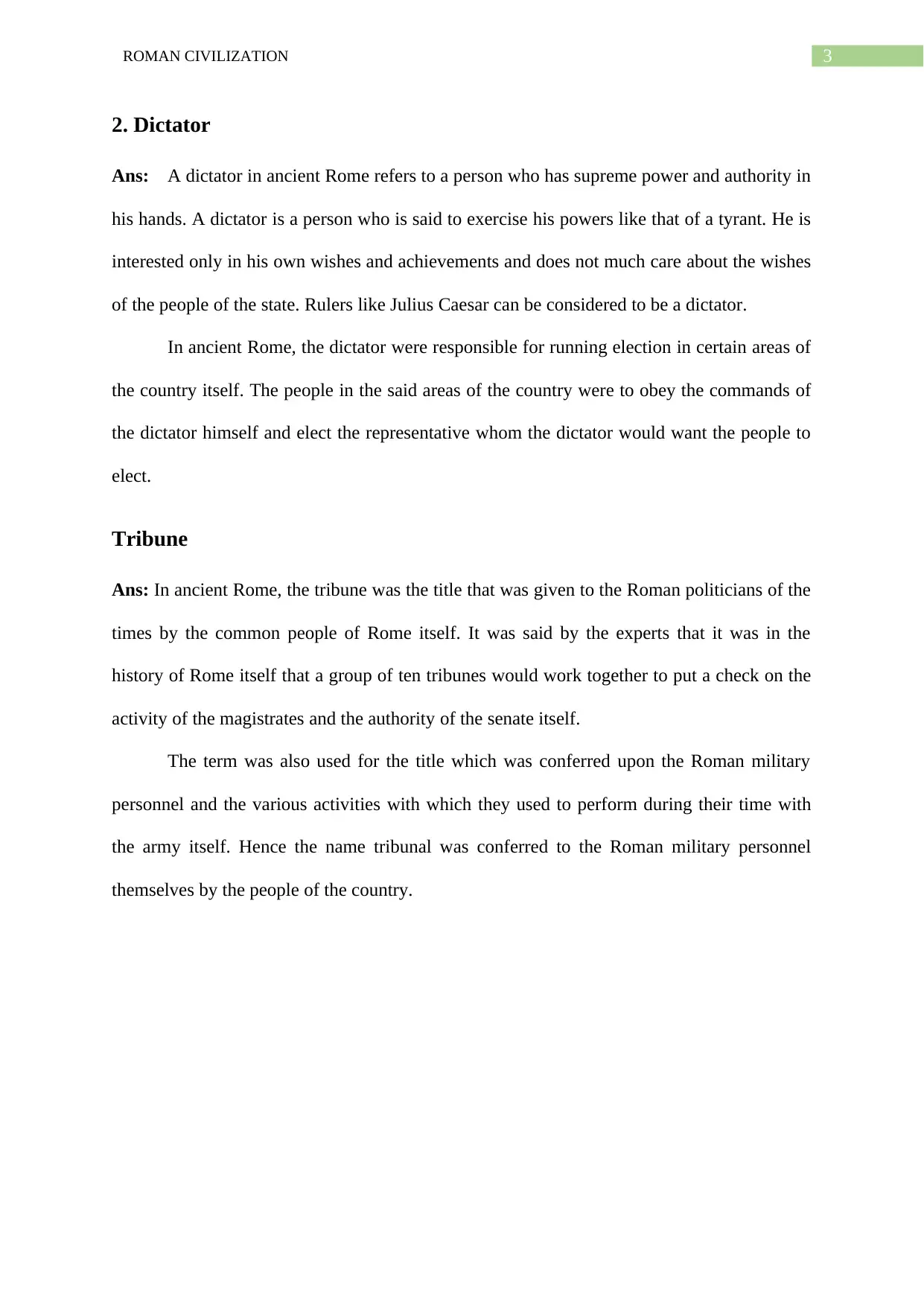
3ROMAN CIVILIZATION
2. Dictator
Ans: A dictator in ancient Rome refers to a person who has supreme power and authority in
his hands. A dictator is a person who is said to exercise his powers like that of a tyrant. He is
interested only in his own wishes and achievements and does not much care about the wishes
of the people of the state. Rulers like Julius Caesar can be considered to be a dictator.
In ancient Rome, the dictator were responsible for running election in certain areas of
the country itself. The people in the said areas of the country were to obey the commands of
the dictator himself and elect the representative whom the dictator would want the people to
elect.
Tribune
Ans: In ancient Rome, the tribune was the title that was given to the Roman politicians of the
times by the common people of Rome itself. It was said by the experts that it was in the
history of Rome itself that a group of ten tribunes would work together to put a check on the
activity of the magistrates and the authority of the senate itself.
The term was also used for the title which was conferred upon the Roman military
personnel and the various activities with which they used to perform during their time with
the army itself. Hence the name tribunal was conferred to the Roman military personnel
themselves by the people of the country.
2. Dictator
Ans: A dictator in ancient Rome refers to a person who has supreme power and authority in
his hands. A dictator is a person who is said to exercise his powers like that of a tyrant. He is
interested only in his own wishes and achievements and does not much care about the wishes
of the people of the state. Rulers like Julius Caesar can be considered to be a dictator.
In ancient Rome, the dictator were responsible for running election in certain areas of
the country itself. The people in the said areas of the country were to obey the commands of
the dictator himself and elect the representative whom the dictator would want the people to
elect.
Tribune
Ans: In ancient Rome, the tribune was the title that was given to the Roman politicians of the
times by the common people of Rome itself. It was said by the experts that it was in the
history of Rome itself that a group of ten tribunes would work together to put a check on the
activity of the magistrates and the authority of the senate itself.
The term was also used for the title which was conferred upon the Roman military
personnel and the various activities with which they used to perform during their time with
the army itself. Hence the name tribunal was conferred to the Roman military personnel
themselves by the people of the country.
Paraphrase This Document
Need a fresh take? Get an instant paraphrase of this document with our AI Paraphraser
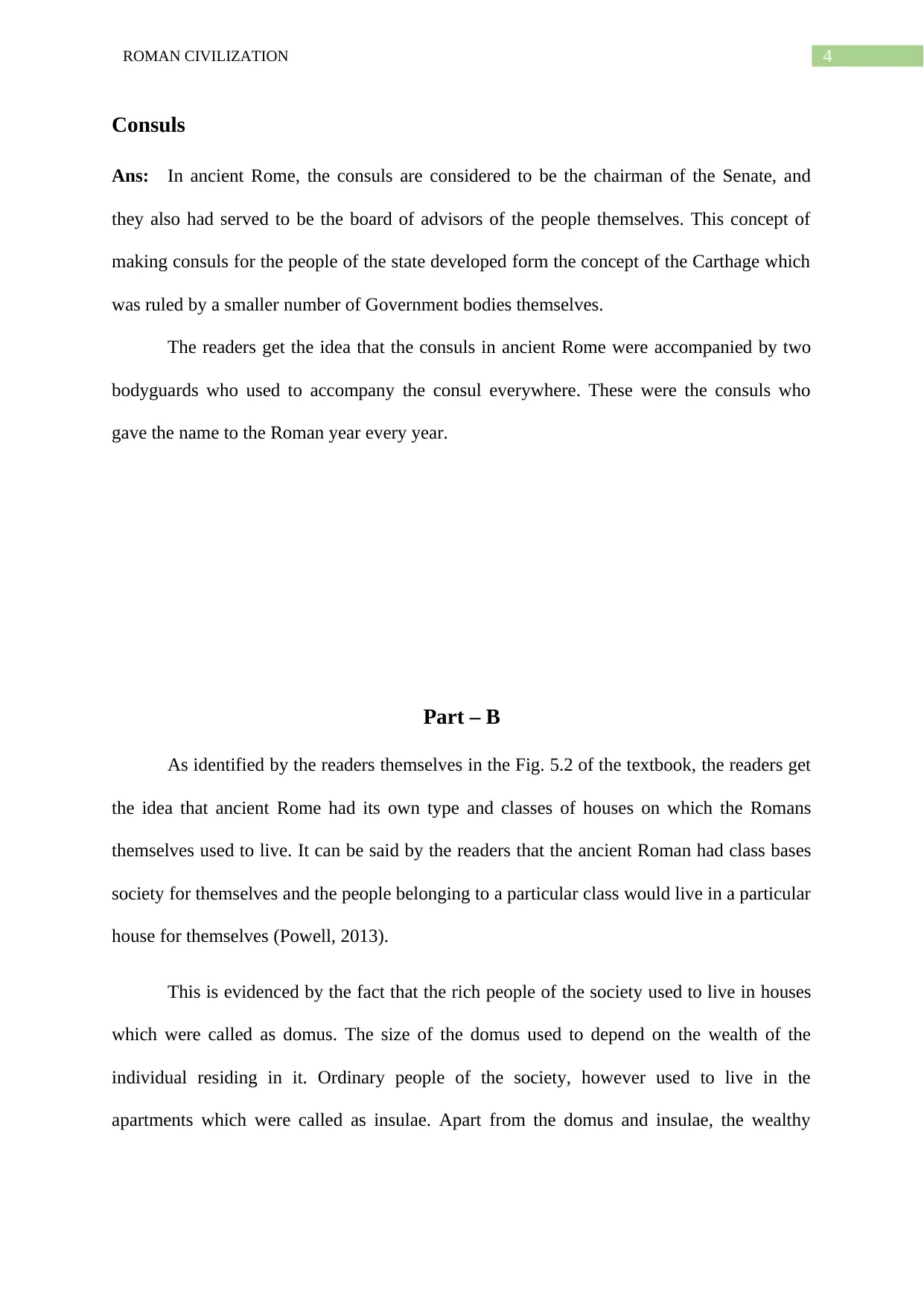
4ROMAN CIVILIZATION
Consuls
Ans: In ancient Rome, the consuls are considered to be the chairman of the Senate, and
they also had served to be the board of advisors of the people themselves. This concept of
making consuls for the people of the state developed form the concept of the Carthage which
was ruled by a smaller number of Government bodies themselves.
The readers get the idea that the consuls in ancient Rome were accompanied by two
bodyguards who used to accompany the consul everywhere. These were the consuls who
gave the name to the Roman year every year.
Part – B
As identified by the readers themselves in the Fig. 5.2 of the textbook, the readers get
the idea that ancient Rome had its own type and classes of houses on which the Romans
themselves used to live. It can be said by the readers that the ancient Roman had class bases
society for themselves and the people belonging to a particular class would live in a particular
house for themselves (Powell, 2013).
This is evidenced by the fact that the rich people of the society used to live in houses
which were called as domus. The size of the domus used to depend on the wealth of the
individual residing in it. Ordinary people of the society, however used to live in the
apartments which were called as insulae. Apart from the domus and insulae, the wealthy
Consuls
Ans: In ancient Rome, the consuls are considered to be the chairman of the Senate, and
they also had served to be the board of advisors of the people themselves. This concept of
making consuls for the people of the state developed form the concept of the Carthage which
was ruled by a smaller number of Government bodies themselves.
The readers get the idea that the consuls in ancient Rome were accompanied by two
bodyguards who used to accompany the consul everywhere. These were the consuls who
gave the name to the Roman year every year.
Part – B
As identified by the readers themselves in the Fig. 5.2 of the textbook, the readers get
the idea that ancient Rome had its own type and classes of houses on which the Romans
themselves used to live. It can be said by the readers that the ancient Roman had class bases
society for themselves and the people belonging to a particular class would live in a particular
house for themselves (Powell, 2013).
This is evidenced by the fact that the rich people of the society used to live in houses
which were called as domus. The size of the domus used to depend on the wealth of the
individual residing in it. Ordinary people of the society, however used to live in the
apartments which were called as insulae. Apart from the domus and insulae, the wealthy
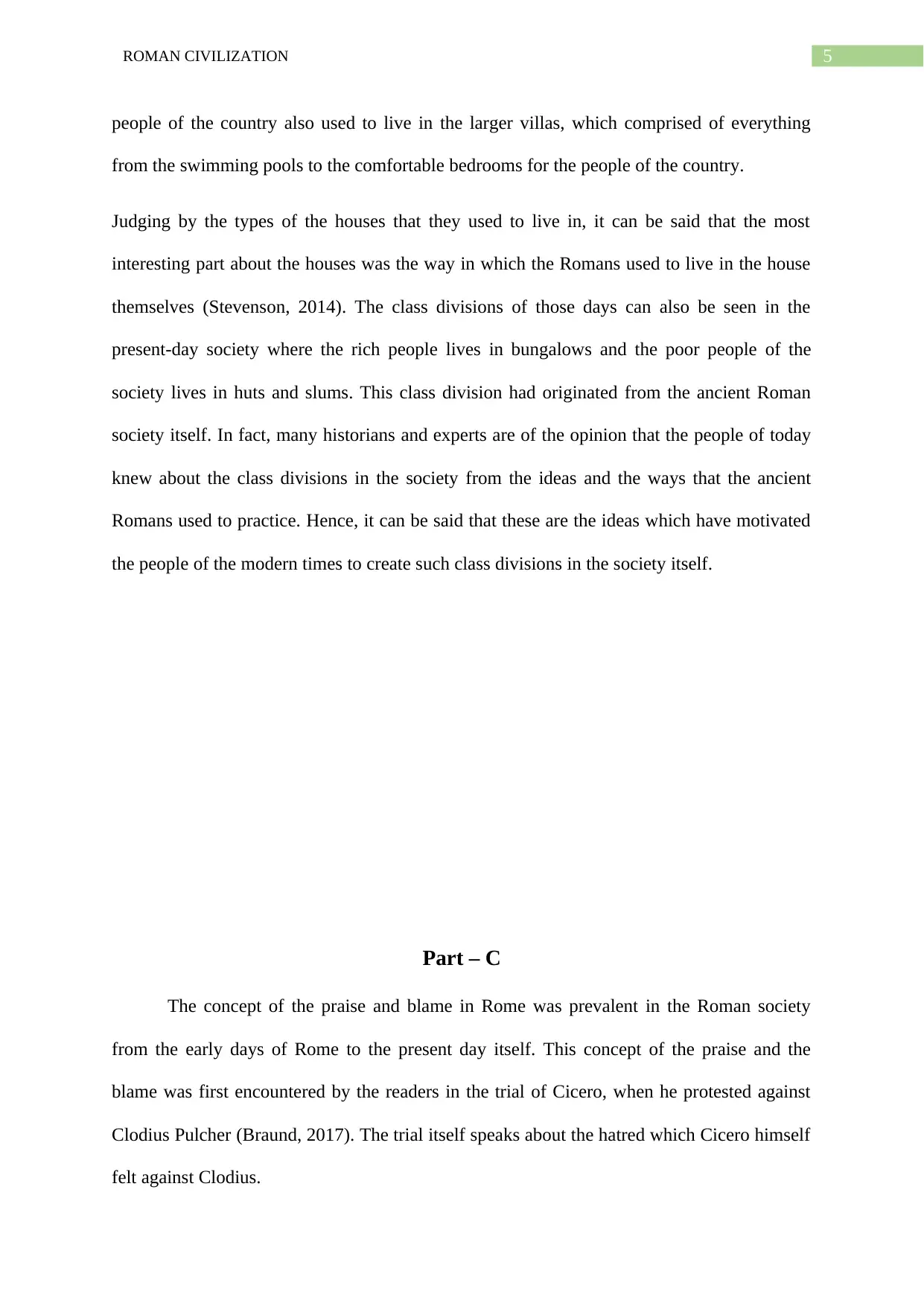
5ROMAN CIVILIZATION
people of the country also used to live in the larger villas, which comprised of everything
from the swimming pools to the comfortable bedrooms for the people of the country.
Judging by the types of the houses that they used to live in, it can be said that the most
interesting part about the houses was the way in which the Romans used to live in the house
themselves (Stevenson, 2014). The class divisions of those days can also be seen in the
present-day society where the rich people lives in bungalows and the poor people of the
society lives in huts and slums. This class division had originated from the ancient Roman
society itself. In fact, many historians and experts are of the opinion that the people of today
knew about the class divisions in the society from the ideas and the ways that the ancient
Romans used to practice. Hence, it can be said that these are the ideas which have motivated
the people of the modern times to create such class divisions in the society itself.
Part – C
The concept of the praise and blame in Rome was prevalent in the Roman society
from the early days of Rome to the present day itself. This concept of the praise and the
blame was first encountered by the readers in the trial of Cicero, when he protested against
Clodius Pulcher (Braund, 2017). The trial itself speaks about the hatred which Cicero himself
felt against Clodius.
people of the country also used to live in the larger villas, which comprised of everything
from the swimming pools to the comfortable bedrooms for the people of the country.
Judging by the types of the houses that they used to live in, it can be said that the most
interesting part about the houses was the way in which the Romans used to live in the house
themselves (Stevenson, 2014). The class divisions of those days can also be seen in the
present-day society where the rich people lives in bungalows and the poor people of the
society lives in huts and slums. This class division had originated from the ancient Roman
society itself. In fact, many historians and experts are of the opinion that the people of today
knew about the class divisions in the society from the ideas and the ways that the ancient
Romans used to practice. Hence, it can be said that these are the ideas which have motivated
the people of the modern times to create such class divisions in the society itself.
Part – C
The concept of the praise and blame in Rome was prevalent in the Roman society
from the early days of Rome to the present day itself. This concept of the praise and the
blame was first encountered by the readers in the trial of Cicero, when he protested against
Clodius Pulcher (Braund, 2017). The trial itself speaks about the hatred which Cicero himself
felt against Clodius.
⊘ This is a preview!⊘
Do you want full access?
Subscribe today to unlock all pages.

Trusted by 1+ million students worldwide
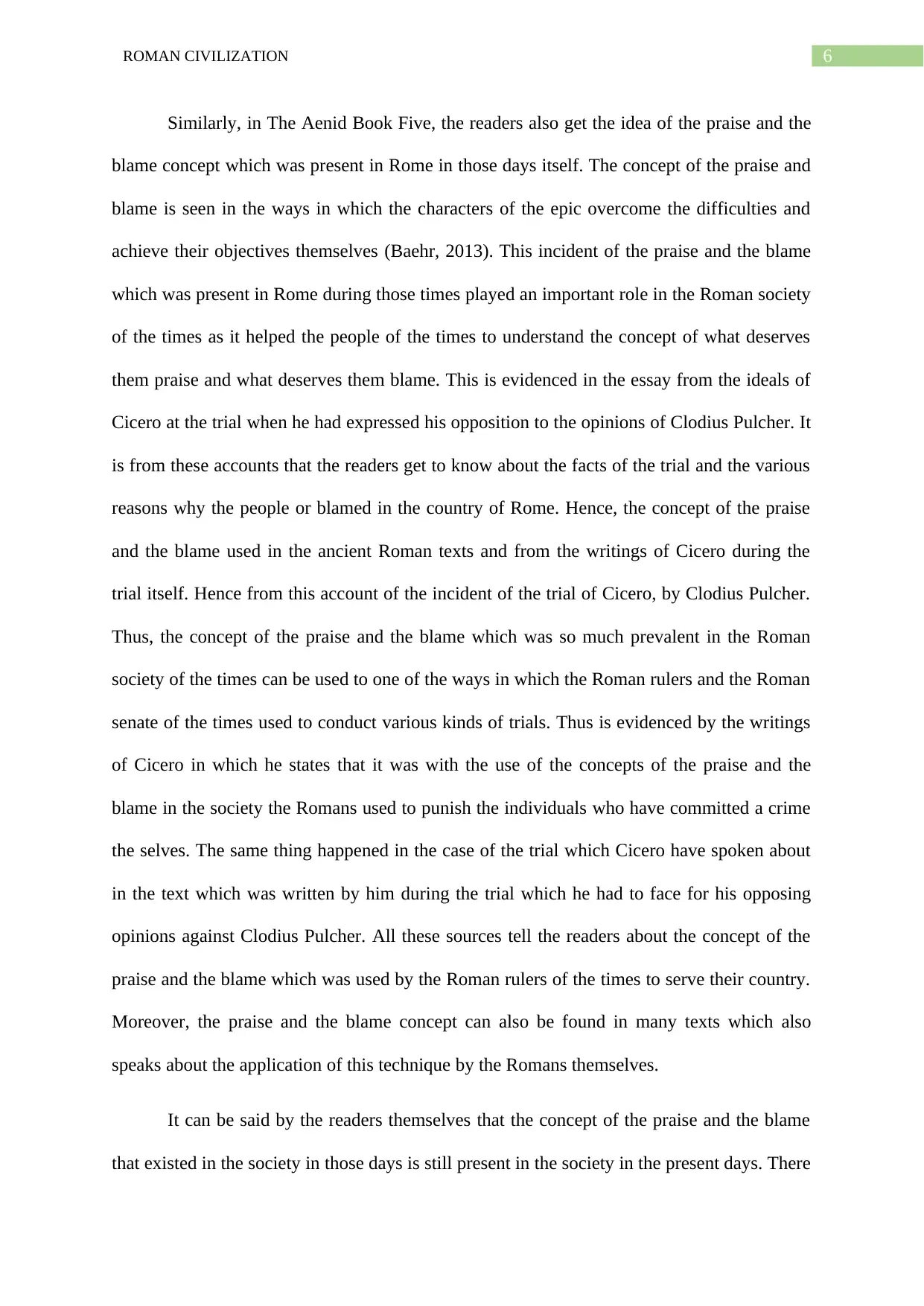
6ROMAN CIVILIZATION
Similarly, in The Aenid Book Five, the readers also get the idea of the praise and the
blame concept which was present in Rome in those days itself. The concept of the praise and
blame is seen in the ways in which the characters of the epic overcome the difficulties and
achieve their objectives themselves (Baehr, 2013). This incident of the praise and the blame
which was present in Rome during those times played an important role in the Roman society
of the times as it helped the people of the times to understand the concept of what deserves
them praise and what deserves them blame. This is evidenced in the essay from the ideals of
Cicero at the trial when he had expressed his opposition to the opinions of Clodius Pulcher. It
is from these accounts that the readers get to know about the facts of the trial and the various
reasons why the people or blamed in the country of Rome. Hence, the concept of the praise
and the blame used in the ancient Roman texts and from the writings of Cicero during the
trial itself. Hence from this account of the incident of the trial of Cicero, by Clodius Pulcher.
Thus, the concept of the praise and the blame which was so much prevalent in the Roman
society of the times can be used to one of the ways in which the Roman rulers and the Roman
senate of the times used to conduct various kinds of trials. Thus is evidenced by the writings
of Cicero in which he states that it was with the use of the concepts of the praise and the
blame in the society the Romans used to punish the individuals who have committed a crime
the selves. The same thing happened in the case of the trial which Cicero have spoken about
in the text which was written by him during the trial which he had to face for his opposing
opinions against Clodius Pulcher. All these sources tell the readers about the concept of the
praise and the blame which was used by the Roman rulers of the times to serve their country.
Moreover, the praise and the blame concept can also be found in many texts which also
speaks about the application of this technique by the Romans themselves.
It can be said by the readers themselves that the concept of the praise and the blame
that existed in the society in those days is still present in the society in the present days. There
Similarly, in The Aenid Book Five, the readers also get the idea of the praise and the
blame concept which was present in Rome in those days itself. The concept of the praise and
blame is seen in the ways in which the characters of the epic overcome the difficulties and
achieve their objectives themselves (Baehr, 2013). This incident of the praise and the blame
which was present in Rome during those times played an important role in the Roman society
of the times as it helped the people of the times to understand the concept of what deserves
them praise and what deserves them blame. This is evidenced in the essay from the ideals of
Cicero at the trial when he had expressed his opposition to the opinions of Clodius Pulcher. It
is from these accounts that the readers get to know about the facts of the trial and the various
reasons why the people or blamed in the country of Rome. Hence, the concept of the praise
and the blame used in the ancient Roman texts and from the writings of Cicero during the
trial itself. Hence from this account of the incident of the trial of Cicero, by Clodius Pulcher.
Thus, the concept of the praise and the blame which was so much prevalent in the Roman
society of the times can be used to one of the ways in which the Roman rulers and the Roman
senate of the times used to conduct various kinds of trials. Thus is evidenced by the writings
of Cicero in which he states that it was with the use of the concepts of the praise and the
blame in the society the Romans used to punish the individuals who have committed a crime
the selves. The same thing happened in the case of the trial which Cicero have spoken about
in the text which was written by him during the trial which he had to face for his opposing
opinions against Clodius Pulcher. All these sources tell the readers about the concept of the
praise and the blame which was used by the Roman rulers of the times to serve their country.
Moreover, the praise and the blame concept can also be found in many texts which also
speaks about the application of this technique by the Romans themselves.
It can be said by the readers themselves that the concept of the praise and the blame
that existed in the society in those days is still present in the society in the present days. There
Paraphrase This Document
Need a fresh take? Get an instant paraphrase of this document with our AI Paraphraser
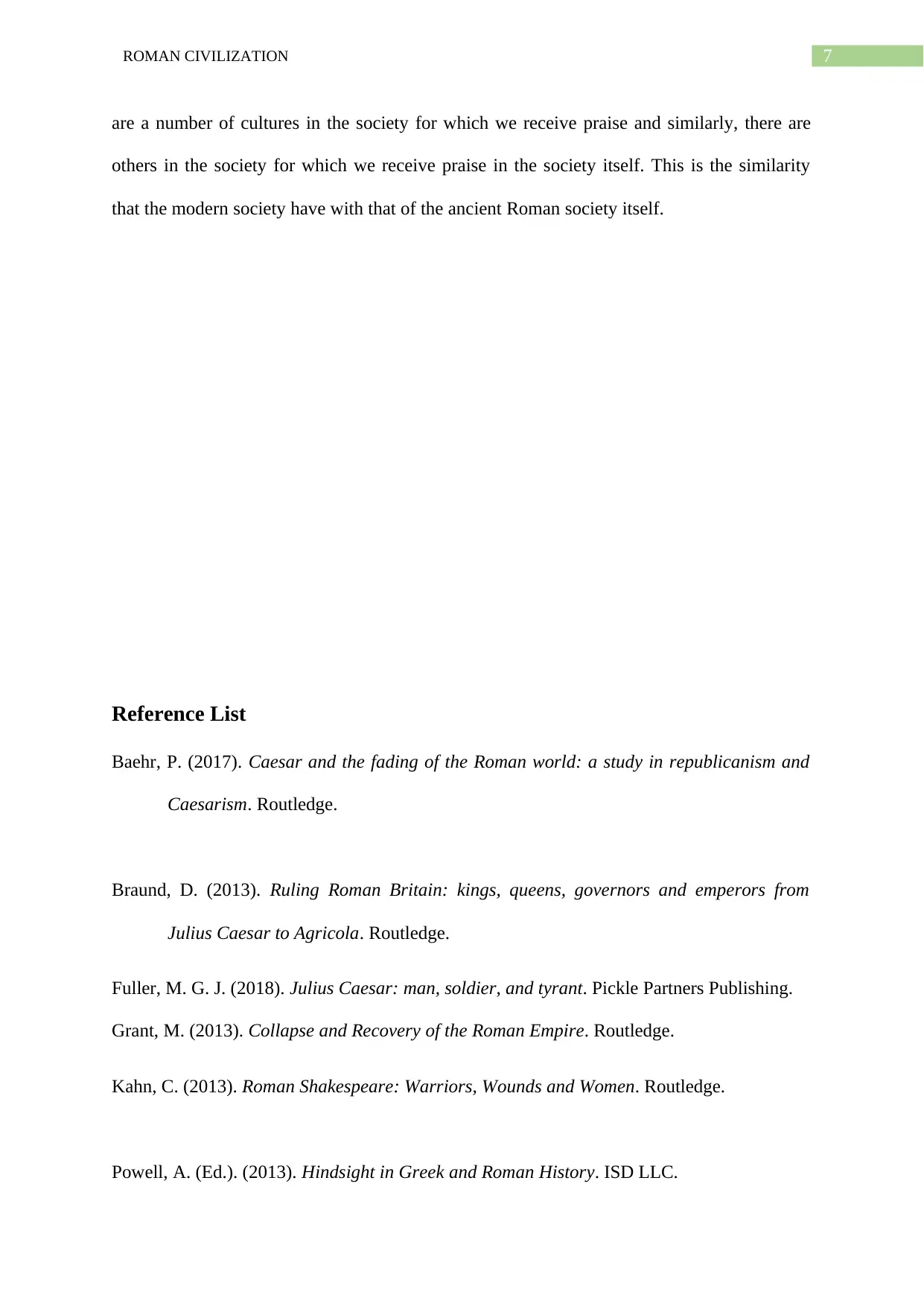
7ROMAN CIVILIZATION
are a number of cultures in the society for which we receive praise and similarly, there are
others in the society for which we receive praise in the society itself. This is the similarity
that the modern society have with that of the ancient Roman society itself.
Reference List
Baehr, P. (2017). Caesar and the fading of the Roman world: a study in republicanism and
Caesarism. Routledge.
Braund, D. (2013). Ruling Roman Britain: kings, queens, governors and emperors from
Julius Caesar to Agricola. Routledge.
Fuller, M. G. J. (2018). Julius Caesar: man, soldier, and tyrant. Pickle Partners Publishing.
Grant, M. (2013). Collapse and Recovery of the Roman Empire. Routledge.
Kahn, C. (2013). Roman Shakespeare: Warriors, Wounds and Women. Routledge.
Powell, A. (Ed.). (2013). Hindsight in Greek and Roman History. ISD LLC.
are a number of cultures in the society for which we receive praise and similarly, there are
others in the society for which we receive praise in the society itself. This is the similarity
that the modern society have with that of the ancient Roman society itself.
Reference List
Baehr, P. (2017). Caesar and the fading of the Roman world: a study in republicanism and
Caesarism. Routledge.
Braund, D. (2013). Ruling Roman Britain: kings, queens, governors and emperors from
Julius Caesar to Agricola. Routledge.
Fuller, M. G. J. (2018). Julius Caesar: man, soldier, and tyrant. Pickle Partners Publishing.
Grant, M. (2013). Collapse and Recovery of the Roman Empire. Routledge.
Kahn, C. (2013). Roman Shakespeare: Warriors, Wounds and Women. Routledge.
Powell, A. (Ed.). (2013). Hindsight in Greek and Roman History. ISD LLC.
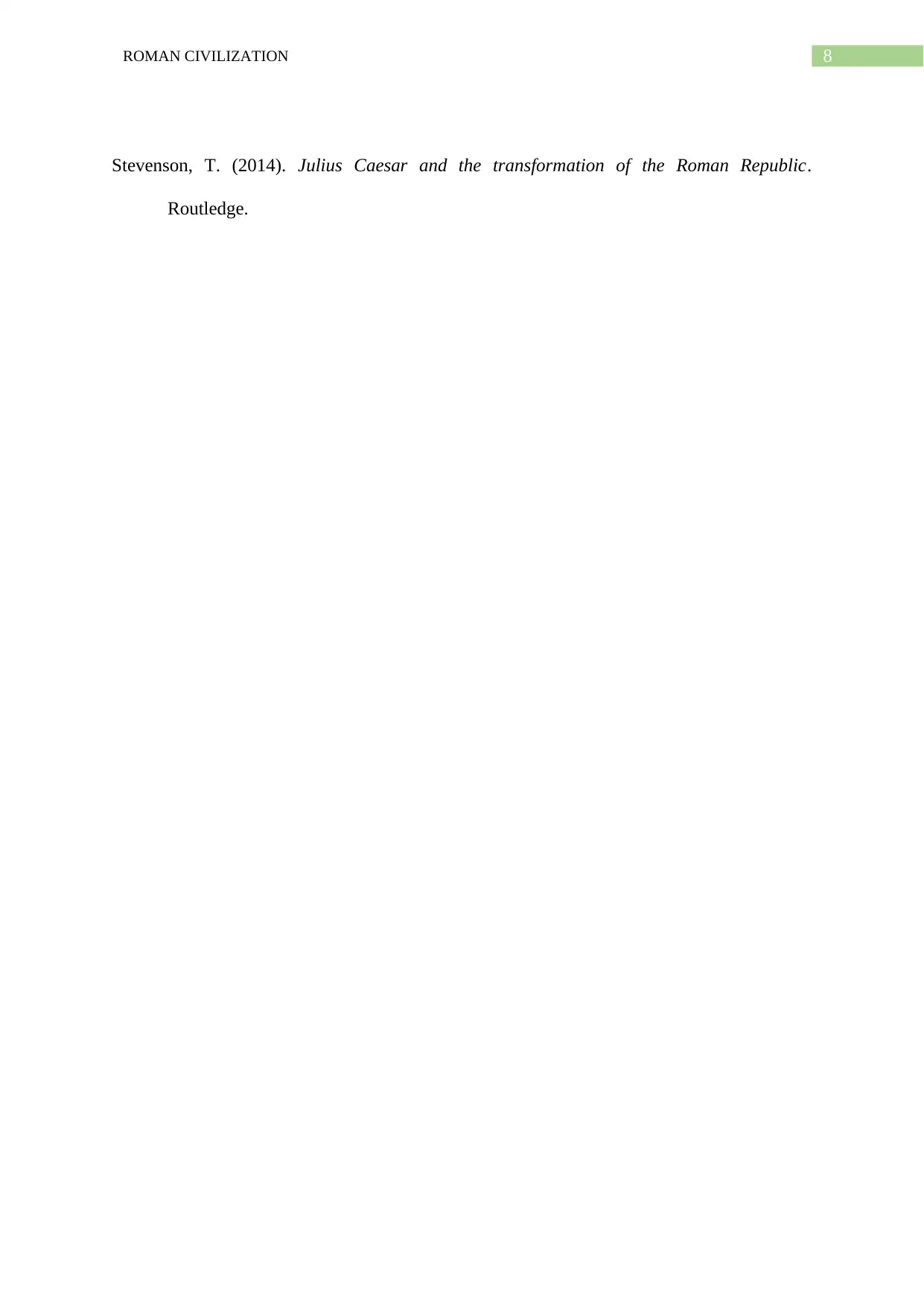
8ROMAN CIVILIZATION
Stevenson, T. (2014). Julius Caesar and the transformation of the Roman Republic.
Routledge.
Stevenson, T. (2014). Julius Caesar and the transformation of the Roman Republic.
Routledge.
⊘ This is a preview!⊘
Do you want full access?
Subscribe today to unlock all pages.

Trusted by 1+ million students worldwide
1 out of 9
Your All-in-One AI-Powered Toolkit for Academic Success.
+13062052269
info@desklib.com
Available 24*7 on WhatsApp / Email
![[object Object]](/_next/static/media/star-bottom.7253800d.svg)
Unlock your academic potential
Copyright © 2020–2026 A2Z Services. All Rights Reserved. Developed and managed by ZUCOL.